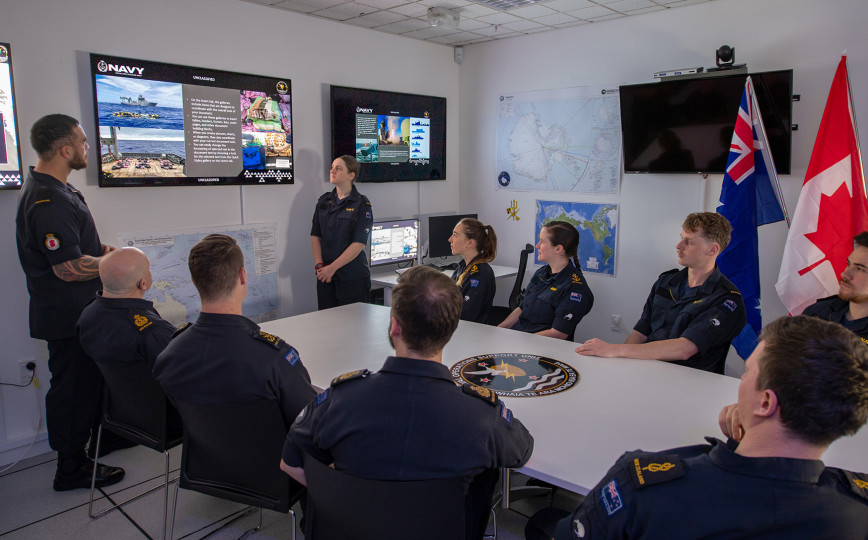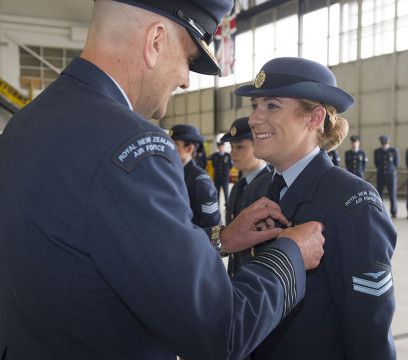Education & training
Valuing education
No matter which Service and trade you choose to pursue your Defence career in, you’re guaranteed to experience the highest possible standards of training and education. As a modern Defence Force, gone are the days of unskilled labour and limited skillsets. Our people are professionally developed and highly trained in specialised fields. Although some of our roles require a tertiary qualification before you join, many have lower initial education requirements as we are fully resourced to train and upskill our people.
Professional development
Everyone starts their career with us by getting to grips with military culture during their initial training. From there, you will move into specialised training to develop you for your chosen trade and career. You could be learning on the job, doing tertiary study, or attending one of many courses relating to your trade and Service. Whatever you do, training is an integral part of being in the Defence Force. You’ll find yourself taking pride in keeping your brain, as well your body, in peak condition.


Ongoing tertiary education
All full time personnel are entitled to access our Voluntary Education Study Assistance (VESA) scheme. This provides financial assistance to undertake part time study toward a Level 4 or higher qualification on the New Zealand Qualifications Framework (NZQF). You can apply for this scheme when you have completed one year of service with us.
Scholarships
We offer a number of scholarships for those who are studying, or have studied, a tertiary qualification related to one of our trades.
Training in the Defence Force
Your first experience of training will be when you join. This is often called recruit training, and introduces you to Defence Force life. It’s a time when you can:
- get to know your new comrades and learn to work as team
- get even fitter than you are already
- understand what we do and how we work
- learn basic skills such as weapon handling, first aid and drill
Recruit training is a bit different for each Service, and also different depending on if you are joining us as an officer or ‘other rank’.
Recruit training
Navy
Army
Air Force
As a new recruit you will stay at the Navy home base, HMNZS Philomel, in Devonport, Auckland. The recruit course you will complete will depend on whether you are joining as an Officer or a Sailor. During this time you will get to know the base and its facilities, spend time with other new recruits and get used to Navy life.
Sailors
Basic Common Training (BCT) is the first course any new sailor undertakes when joining the Navy. This is a 16 week course aiming to take you from civilian to competent and self disciplined Naval Sailor. It is also aimed at confirming the suitability of trainees for the Navy, preparing them for specialist training and life onboard our Ships.
Phase 1 - Introduction
The first phase of training focuses on inducting the trainee into the Navy. It is held at the Recruit Training Squadron and aims to place trainees under limited controlled stress to:
- Develop teamwork/team support in a controlled environment
- Encourage mutual harmony and community well being
- Adapt to Naval discipline and regulations Participate in physical fitness/sport
- Understand and develop self-discipline
- Learn how to care for and clean naval uniform
Phase 2 - Core Military Skills Training
The second phase of training gives the basic skills and knowledge to be in the Navy. Apart from academic and practical training there is an emphasis placed on teamwork. You will develop confidence, self-esteem and self-respect. Much of this phase will be spent doing various forms and levels of physical activity which are designed to encourage teamwork, instil personal discipline and foster comradeship. Parade training is an important part of naval life; it will teach you to think and to work as a team and to complete instruction quickly and correctly. One day in an emergency your life or your comrade’s life may depend on your quick response to a superior’s command. You will learn to think and act without hesitation.
Branch Training
You will then move onto Basic Branch Training (BBT) where you will begin learning skills in your chosen trade.
Officers
Junior Officer Common Training (JOCT) is a 21 week course at Devonport Naval Base. This is the first course you will undertake as an officer in the RNZN. The objective of JOCT is to provide you with the core skills of military, mariner, and leadership to be an effective Officer in the Navy. The course is completed in two phases of training that train key areas of development.
Phase 1 - Introduction
This phase focuses on ‘followership’ and teamwork. Trainees are instructed in basic service knowledge, discipline, parade, and kit preparation. Physical Training will be conducted at all times throughout training to develop a high level of physical and mental fitness that promotes morale, good health, and good habits. This phase will cover various topics including:
- Physical Fitness
- Service Knowledge
- Service Discipline
- Introduction to the Leadership Development Framework
- Damage Control Training
- Weapons Training
- First Aid
- Basic seamanship training
Phase 2 - Fit for Sea
The second phase of training will focus on attributes of being in the Navy in preparation for operational service at sea. Trainees will be taught about the roles and responsibilities on board an RNZN ship. Trainees will also spend time ashore conducting academic and leadership training to further develop as a Naval Officer. This phase will cover various topics including:
- Sea survival
- Ship familiarisation
- Leadership training
- Communications skills
- Defence and Strategic Studies
As a new recruit, you will start your training at Waiouru Military Camp in the central North Island. The recruit course you do will depend on whether you are joining the Army as a general list officer, a specialist officer, or as a soldier.
Soldiers
Your first 16 weeks of training will be spent on the Regular Force Recruit (RRF) course commonly known as 'basic training'. It’ll give you the basic skills you’ll need to become a successful soldier, covering everything from the fundamentals of weapons training to first aid, navigation and lessons on military law.
Downtime
This will be an intense period of training, demanding a lot of you physically. However, you will still get some downtime – including most Sundays, which will be kept free to give you some personal time and the ability to attend church if desired. You can also spend your free time at any of our recreational facilities, including the gym, swimming pool, or library. There are even shops where you can get basic everyday items, so you’ll have access to everything you need.
Visitors’ days and mid-course break
Sometimes there is a break halfway through the course to give you some time to go home and rest before beginning the remainder of your training. There are also two visitors’ days where you can invite your friends and family to visit the camp.
Afterwards
Once you’ve graduated from your RRF course, you'll be posted to your unit at any one of the Army camps within New Zealand. Your next stage of training will be your trade specific ‘corps training’ which will teach you the basics for your specific trade. You'll find life in the Army quite different once you march out of your basic training, in that your freedom and spare time will increase significantly.
You’ll even find that your working days return to normal hours and your accommodation will move from shared rooms to single rooms if you choose to remain living in barracks.
Officers
All Officer Cadets (both general list and special list) are required to complete Initial Induction Training (IIT). This 12 week course will introduce potential officers to the standards and discipline required to be an effective member of the New Zealand Army. It is designed to train basic individual military skills which includes:
- Self-leadership
- Physical Training
- Field-craft
- Military Unarmed Combat
- Weapon handling
- Navigation
- Drill
- Battle-craft
- Radio telephone procedure
- Leadership
New Zealand Commissioning Course (NZCC)
Once completing IIT, General list Officer Cadets will commence NZCC, a 38 week course designed for those with the potential to undertake a career in the New Zealand Army as an officer. Students will be exposed to a range of military environments, aimed at developing the leadership, character, and education of individuals in order to prepare them for commissioned service. Training includes:
- Leading Teams
- Leading Leaders
- Physical Training
- Field-craft
- Enhanced
- Weapon handling
- Navigation
- Drill
- Enhanced Battle-craft
- Radio telephone procedure
- Tactics
- University Study
Special List Officers
Both Regular Force and Reserve Force Special List Officers will now complete all initial training alongside General List Officers in three modules from January to March. Reserve Force personnel have the option of completing Modules 1 and 3 in consecutive years and not attending Module 2. If you think this will apply to you please talk to your recruiter.
As a new aviator you will start your career at RNZAF Base Woodbourne, near Blenheim at the top of the South Island. What you do for your initial training will depend on whether you are joining as an officer or a recruit.
Recruits
Your training will begin with 12 weeks of Recruit Training, where you will learn the values and ethos we hold as a team as well as the basic ropes of Air Force life. During the Air Force basic military training you'll find out if you have got what it takes to be in the Air Force, and learn various subjects including:
- Organisation and Administration
- RNZAF Customs and Protocol
- Drill and Parades
- Military Field Skills and Weapon Training
- First Aid, and Search and Rescue Techniques
- Physical Fitness.
Although you'll find life on base very different to civilian life, you'll soon adjust to the challenging and rewarding lifestyle, knowing that you're on your way to a great Air Force career.
At the conclusion of your course there will be a graduation ceremony where you'll get to celebrate the end of your Recruit Training, and where some cadets will be awarded trophies for outstanding academic and practical achievement. You'll then move onto trade training, which will give you the chance to excel even further by proving yourself in your chosen specialist field.
Officers
All individuals selected to become commissioned officers in the RNZAF are required to complete the RNZAF Officer Commissioning Course (ROC). This 26 week course is designed to prepare students with the knowledge and experience necessary for commissioned service and the beginning of a career in leadership. This course will cover various subjects including:
- RNZAF Customs and Protocol
- Drill and Parades
- Military Law
- Military Field Skills and Weapons Training
- Defence and Strategic Studies
- Personnel Administration
- Communication Skills
- Command, Leadership and Management
- First Aid
Trade training
Once you’ve completed your initial recruit training, you will move on to specialist training in your chosen trade. Details about the types of courses you might do are available on each trade page on this website. Many of our trades also offer recognised NZQA standards as part of your training.
As well as specialist trade training, you will also have the opportunity to attend courses in other subjects to assist with your professional development and suitability for promotion.